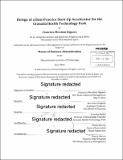Design of a best-practice start-up accelerator for the Granada Health Technology Park
Author(s)
Merchán Higuera, Francisca
DownloadFull printable version (10.00Mb)
Other Contributors
Sloan School of Management.
Advisor
Fiona Murray.
Terms of use
Metadata
Show full item recordAbstract
Accelerators are ecosystem catalyzers introduced in 2005 by Y-Combinator. They are time-bounded programs to facilitate core resources for entrepreneurs (mentors, capital, training), with the goal of making the trial-and-error innovation process faster and more efficient. Accelerators are schools of entrepreneurship and, often, a certificate of quality. The province of Granada generates more than 3.46% of Spain's scientific production; however, it contributes with only 1.4% to the domestic GDP (year 2011). A well-designed startup accelerator can help close the gap between the innovation capacity and the economic impact on the region by fostering a vibrant ecosystem of innovation-driven entrepreneurs. Our research examines the idiosyncratic needs of the entrepreneurial ecosystem in Granada, because this understanding is crucial to address the local limitations. In parallel, we studied a diverse typology of accelerators (e.g., selected Health based accelerators in the US and Spanish accelerators) and created an exhaustive benchmark analysis across them. Finally, we proposed a "best-practice" accelerator for the PTS Granada, including choices such as the value proposition, the intake process, the program duration, the amount of seed capital, the role of mentors, and the nature of sponsors. We determined that an accelerator may be non sufficient for emergent entrepreneurial ecosystems. For those cases, we offer additional recommendations to improve the pre- and post-acceleration phases.
Description
Thesis: M.B.A., Massachusetts Institute of Technology, Sloan School of Management, 2014. Cataloged from PDF version of thesis. Includes bibliographical references (page 64).
Date issued
2014Department
Sloan School of ManagementPublisher
Massachusetts Institute of Technology
Keywords
Sloan School of Management.